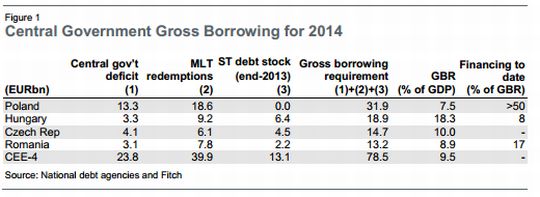:quality(80)/business-review.eu/wp-content/uploads/2014/01/Fitch-Ratings.jpg)
Fitch Ratings expects the gross public borrowing requirement (GPBR) of the larger eastern-central European sovereigns of Poland, the Czech Republic,Hungary and Romania to reach EUR78.5bn in 2014 (9.5% of estimated aggregate GDP), down from EUR96bn in 2013 (12.4% of aggregate GDP). This compares favourably with an expected GPBR for the eurozone of 15.1%. However, as in previous years, there is some dispersion within the CEE-4, with Hungary having relatively larger financing needs.
Favourable Financing Conditions
In late 2013 and early 2014 financing conditions in the external markets were favourable for all CEE-4 sovereigns. Poland, Hungary and Romania all took advantage of this to issue Eurobonds. The Polish government has stated that it intends to fulfil half of its borrowing requirement for 2014 by end-January.
Recovery Aids Fiscal Discipline
An improving macroeconomic picture should facilitate budget goals.
Fitch forecasts that all CEE-4 countries will run budget deficits in line with commitments undertaken at the EU level. For Hungary, the Czech Republic and Romania, this means a general government deficit below 3% of GDP. The agency expects Poland to make progress towards exiting the Excessive Deficit Procedure in 2015, notwithstanding distortions from the expected transfer of pension assets to the public sector in 2014.
Less Vulnerable to Turbulence
Moderate budget financing and debt redemption needs should help CEE-4 countries withstand market turbulence from the gradual withdrawal of US extraordinary monetary stimulus. The current-account balances of all CEE-4 countries have improved markedly since the crisis, and substantial buffers are in place. Poland and Romania benefit from multilateral financing arrangements (a flexible credit line from the IMF in Poland’s case and a precautionary stand-by arrangement with the IMF and EU in Romania’s).
Risks from Non-Resident Positions:
Non-resident investors feature strongly in Hungary and Poland, where they hold half of government securities. The share is set to rise in Poland once the reform of open pension funds is completed, which could carry additional risks. Non-resident shares are lower in the Czech Republic and Romania, although they have risen in the latter.
Politics Pose Residual Risks
Several countries in the region face a busy electoral calendar in 2014 but Fitch does not expect the results to bring significant changes in economic policy. Nevertheless, there is a risk that political uncertainty could damage investor sentiment towards CEE-4, particularly if it coincides with periods of financial market turbulence or instability.




:quality(80)/business-review.eu/wp-content/uploads/2024/04/Ciprian-Muresan.png)




:quality(80)/business-review.eu/wp-content/uploads/2024/02/IMG_6951.jpg)

:quality(80)/business-review.eu/wp-content/uploads/2024/03/COVER-1-3.jpg)



:quality(80)/business-review.eu/wp-content/uploads/2024/04/cover-april.jpg)
:quality(50)/business-review.eu/wp-content/uploads/2024/04/Teren-Recas-2.jpg)
:quality(50)/business-review.eu/wp-content/uploads/2024/04/One-Tower.jpg)
:quality(50)/business-review.eu/wp-content/uploads/2024/04/easports.jpg)